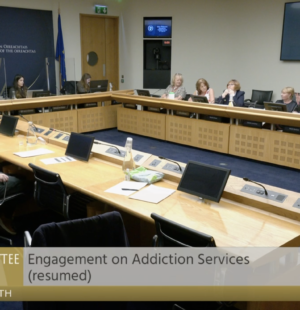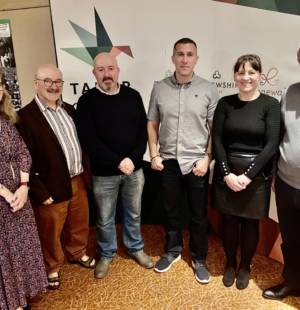7 Tips for Writing an Intervention Letter
Are you planning an intervention for your loved one struggling with an addiction? One of our April blogs was “A Guide to Staging an Intervention” and might also be a useful read for you, but in this blog, we are going to focus on writing an intervention letter and our top tips to do so successfully.
To stand face to face with someone you care deeply about at an intervention and tell them the pain and heartache their addiction and behaviour has caused you takes a lot of courage, dedication, and bravery. But have you considered writing an intervention letter? It can be a highly effective way of getting your message across to your loved one clearly.
The build up to an intervention can be a time full of uncertainty, desperately wondering how your loved one suffering from addiction will react to it and thinking about the exact words you want to say. With emotions running high, it sometimes can be a challenge to remember everything you want to say and make sure that all participants voices are heard. That is why many specialists recommend reading aloud an intervention letter to your loved one during an intervention. Intervention letters can be extremely powerful tools in helping those suffering from an addiction understand exactly how their family and loved ones lives are being impacted by their addiction. Intervention letters can act as a script for your intervention, making sure everything that was planned to be said is said, and combats the threat of an individual becoming overwhelmed or forgetting what they had planned to say.
7 TIPS
Below are seven tips or guidelines for writing an effective intervention letter. Each point represents a section of the letter, some points are brief while others are intended to be longer. Together all seven tips provide a comprehensive template for a good intervention letter giving you the best chance of a positive outcome.
TIP 1 – HEARTFELT STATEMENT
Begin your intervention with a brief heartfelt statement of love and concern that specifically states the nature of your relationship (e.g. older brother, employer, friend).
TIP 2 – LOVE
This should be the longest part of the letter. You should give detailed reasons why you love and care about the person, remembering when you were proud of them, when they were there for you, etc. Somewhat like a eulogy, you should communicate your gratitude to the person. This part of the letter can often include humour or a humorous anecdote.
TIP 3 – REFRAMING
It’s important to state your understanding of the disease of chemical dependency that you understand substance abuse is a disease. Differentiate it from a character or willpower issue. By discussing it more in a medical context, your loved one suffering from the addiction may feel less guilty. Talk about how you know the difference between who your loved one really is verses how they behave when they are using. Addiction has the power to make extraordinary people do not such extraordinary things. At this stage we would also recommend discussing the need for professional treatment.
TIP 4 – FACTS
It’s a good idea to include statements of specific, first-hand examples of your loved one’s problem behaviour when using, highlighting the consequences, both for the addicted person and for you. We would recommend having more than one specific example also. It’s important stay away from a judgmental or angry language. Let the facts speak for themselves. If you have no first-hand knowledge, talk about your feelings of concern, worry or other observations (e.g. what it’s doing to the children). Overall, we would recommend two to four facts, each described in no more than a sentence or two. Also try to stick to using ‘I’ statements rather than ‘You’ which can come across as critical.
TIP 5 – COMMITMENT
Make a personal commitment to stand by the addicted person and to help him or her in any way possible and appropriate. It is important to remind your loved one of your concern and the positive feelings you have. At this point, you should again be discussing professional treatment and how this is the best option.
TIP 6 – ASK
Make a direct request for your loved one suffering with an addiction to accept the treatment programme being suggested. Be specific about the treatment centre, it’s location, length of stay, etc. Ask that they make a commitment to contact the treatment centre today and follow through 100%.
TIP 7 – AFFIRMATION
It’s important to end on a positive note, showing faith in them to follow through, perhaps referring back to tip number two above.
We hope this guide and tips has helped you with your intervention letter and your intervention planning. The overriding advice we would give when writing an intervention letter is to take your time, and write it from the heart.
NEVER GIVE UP
Don’t expect immediate results from the intervention. Nobody knows the amount of conversations you will need to have with your loved one before they accept that they need help. Some people might only be one, but others will be multiple conversations over time. The important thing is to never give up on your loved one no matter what as addiction treatment does work!
TABOR GROUP’S FAMILY SUPPORT PROGRAMME
Please speak with Tabor Group if you would like to discuss the content of the letter further. Our Family Support Programme is designed to help concerned persons of the individual with substance use disorder. It has been our experience that when a family is affected by addiction, the entire family can benefit from support. Our Family Support Programme includes education, one-to-one support, peer support groups, telephone support, intervention advice and more. To contact the Family Support Programme, call us on 021 488 7110.
Recent Posts
- How to Help a Loved One Struggling with Addiction
- Tabor Group Calls for Urgent Funding to Address Growing Addiction Crisis
- Forgiveness in Recovery
- National Drugs Strategy launches interactive map to facilitate access to 442 publicly-funded drug treatment
- Statement from Colette Kelleher, CEO Tabor Group
Categories
Archives
- September 2024
- July 2024
- June 2024
- January 2024
- December 2023
- August 2023
- July 2023
- May 2023
- April 2023
- March 2023
- January 2023
- October 2022
- September 2022
- August 2022
- July 2022
- June 2022
- May 2022
- April 2022
- March 2022
- February 2022
- January 2022
- December 2021
- November 2021
- October 2021
- September 2021
- August 2021
- July 2021
- June 2021
- May 2021
- April 2021
- March 2021
- February 2021
- January 2021
- December 2020
- November 2020
- October 2020
- September 2020
- August 2020
- July 2020
- June 2020
- May 2020
- April 2020
- March 2020
- February 2020
- January 2020
- December 2019
- November 2019
- October 2019
- September 2019
- August 2019
- July 2019
- June 2019
- May 2019
- April 2019
- March 2019
- February 2019
- January 2019
- December 2018
- November 2018
- October 2018
- September 2018
- August 2018
- July 2018
- June 2018
- May 2018
- April 2018
- March 2018
- February 2018
- January 2018
- December 2017
- November 2017
- October 2017
- September 2017
- August 2017
- July 2017
- June 2017
- May 2017
- April 2017
- March 2017
- February 2017
- January 2017
- December 2016
- November 2016
- October 2016
- September 2016
- August 2016
- July 2016
- April 2016
- March 2016
- December 2015
- March 2015












